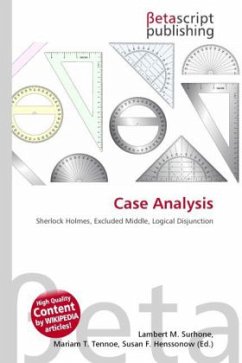High Quality Content by WIKIPEDIA articles! Case analysis is one of the most general and applicable methods of analytical thinking, depending only on the division of a problem, decision or situation into a sufficient number of separate cases. Analysing each such case individually may be enough to resolve the initial question. The principle of case analysis is invoked in the celebrated remark of Sherlock Holmes, to the effect that when one has eliminated the impossible, what remains must be true, however unlikely that seems.The logical roots of the Holmes remark speak to the principle of excluded middle. That indicates the importance to case analysis of logical disjunction: stringing together propositions with the logical connective "or". Medical diagnosis can indeed follow the Holmes pattern, with a patient's symptom possibly caused by a number of conditions: the patient suffers from A or B or ... or illness I; see differential diagnosis. Deductive logic is applied to reducing the number of cases; see case-based reasoning.








